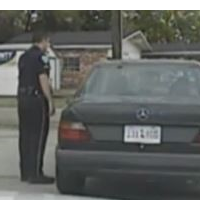The Shady Practice of “Investigatory” Police Stops
 Officer Michael Slager speaks to Walter Scott after pulling him over for a broken brake light (photo: North Charleston Police Department)
Officer Michael Slager speaks to Walter Scott after pulling him over for a broken brake light (photo: North Charleston Police Department)
The police killing of a South Carolina man has brought attention to the use of traffic stops, particularly of black men, as an excuse to investigate drivers and vehicles.
On April 4, North Charleston Officer Michael Slager shot and killed Walter Scott after Slager claimed Scott seized his Taser, forcing the officer to draw his service revolver. Video footage taken by a bystander, however, showed Slager using his Taser before firing eight bullets at a fleeing Scott.
According to footage released by the North Charleston Police Department, Slager pulled Scott over because Scott’s older-model Mercedes-Benz had a broken third brake light. Instances of police pulling over motorists for minor traffic violations are known as investigatory stops. They are used “as pretext for investigations of the driver and the vehicle,” wrote Jamelle Bouie of Slate.
Unlike routine safety-related traffic stops, such as those for speeding or driving erratically, investigatory stops are often for minor equipment-related matters, but can lead to vehicle searches, interrogations of motorists and sometimes arrests. Research has shown that black men are overwhelmingly the targets of such stops.
A study by Charles R. Epp, Steven Maynard-Moody, and Donald Haider-Markel of traffic stops in Kansas City, Missouri, showed that only 35% of stops of African-Americans were for safety-related issues; the remainder were investigatory stops. In contrast, 60% of stops of white people were for traffic safety.
Age is also a factor. For black men, the odds of being stopped this way start at 30 percent and don’t reach the 10 percent mark until they’re in their 50s,” Bouie wrote. “Indeed, a black man at 70 is more likely to be stopped for a minor offense and investigated than a white man in his 30s, despite a much lower chance of criminal activity.”
In comparison, the odds of white males being stopped “in this manner peak when they’re between 16 to 25 years old—when there’s a 15% chance—and decline so that by middle age, a given white man will have a smaller than 10% chance of being in an investigatory stop.”
In contrast to investigatory stops, the driver’s race and gender have little to do with the likelihood of being subject to a routine traffic stop.
-Noel Brinkerhoff, Steve Straehley
To Learn More:
Broken Taillight Policing (by Jamelle Bouie, Slate)
Driving While Black (by Charles Epp and Steven Maynard-Moody, Washington Monthly)
When Is a Police Encounter an Investigative Stop? (Ohio State Bar Association)
- Top Stories
- Unusual News
- Where is the Money Going?
- Controversies
- U.S. and the World
- Appointments and Resignations
- Latest News
- Trump to Stop Deportations If…
- Trump Denounces World Series
- What If China Invaded the United States?
- Donald Trump Has a Mental Health Problem and It Has a Name
- Trump Goes on Renaming Frenzy






Comments